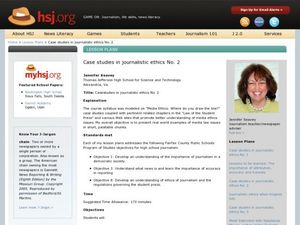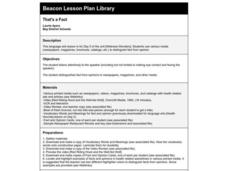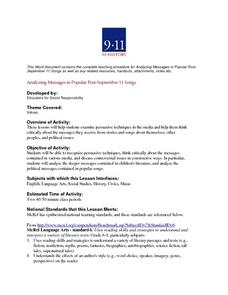Curated OER
Breaking News English: International Car Free Day
In this English worksheet, students read "International Car Free Day," and then respond to 47 fill in the blank, 7 short answer, 20 matching, and 8 true or false questions about the selection.
NPR
Civil Rights of Japanese-American Internees
Prompted by a viewing of Emiko and Chizu Omori’s Rabbit in the Moon, a documentary about the internment of Japanese-Americans during World War II, high schoolers examine a series of documents, including the Bill of Rights and the UN’s...
Curated OER
The Art of Violence
Violence and human suffering, as represented in art and film, are the focus of an investigation of the power of visual images and the moral implications of such representations. Class members examine “Guernica,” Pablo Picasso’s massive...
Curated OER
Introducing Elections Unit
Students discover the political parties of our country by participating in a role playing activity. For this U.S. Government lesson, students visit several different classrooms that each represent one of the political parties in...
Curated OER
Discovering National Parks
Students work to preserve American National Parks. In this environmental activism lesson, students research the history of the national parks and determine why they were created. Students then focus on protecting the land, using it for...
Curated OER
Case Studies in Journalistic Ethics No. 2
Learners use texts on media ethics and various Web sites to explore real world examples of media law issues. For this media ethics lesson, students examine the Food Lion case using a transcript from the...
Curated OER
Power, Persuasion & Propaganda: Exploring Multiple Motives
Students recognize different motives even in non-commercial media. They analyze the role of media in a democratic society and wrestle with ethical issues concerning media and the public good. They create a media message with one or more...
Curated OER
Who is the Expert? Exploring Credible Sources in Healthcare
How do you decide what sources are credible when researching online? Evaluate sources with a focus on researching health issues. After brainstorming common health concerns and how they would try to diagnose these problems, class members...
Curated OER
That's a Fact
Third graders use various media (newspapers, magazines, brochures, catalogs, etc.) to distinguish fact from opinion
Curated OER
What Influences Our Perception of Gender Roles?
Learners research gender equity and the media. In this gender equity lesson, students evaluate the influence of various media on both individuals and society. Learners discuss examples of media that portray gender roles and...
Curated OER
Culture Creation vs. Culture Consumption - Finding Voice Through Digital Storytelling
Ninth graders explore the power of media in culture and Gandhi's philosophy of nonviolence. In this nonviolence and media lesson, 9th graders analyze Gandhi's nonviolent methods for social change and discuss the media's power to create...
Curated OER
Lessons to be Learned: The Importance of Attribution, Accuracy, and Honesty
Students investigate real world examples of media law issues. In this media law instructional activity, students read Janet Cooke’s feature and respond to the writing. Students read articles by Stephen Glass to highlight facts...
Curated OER
Creating Scrolls Based on the illustrated TALE OF GENJI
Students identify formal elements that characterize the scroll, work in a variety of media, from traditional to digital, to create their own scrolls, work into digital printout with at least two media, and engage in meaningful critiques...
Curated OER
Grappling with Identity in Latino Poetry
Students identify some common themes involving the Latino immigrant experience as conveyed through a variety of media, explore issues of identity in some examples of poetry written by Latinos and learn some basic poetry reading strategies.
Curated OER
Are You Plugged In?
Students develop an awareness of one's own media habits. Make connections between ads and one's own consumer behavior. They track their current TV and/or Internet viewing habits and video game time by keeping a TV Diary for one week.
Curated OER
Recognizing a Message's Point of View
Students study the physical, mental, and social health benefits of regular exercise while attempting to recognize the point of view of media messages. They read an article and discern ways in which they can make regular exercise a part...
Curated OER
Hidden Messages: The Growth of Product Placement
Pupils identify product placements they see in TV programs and movies. They build awareness of the pervasiveness of advertising in their culture. They develop critical skills necessary to think independently in a media saturated consumer...
Curated OER
Body / Kinesthetic & Visual / Spatial
Tenth graders produce a multimedia project using HyperStudio. This project is similiar to an "information kiosk", with engaging media to "tell a story" about the Battle of Gettysburg. They have knowledge about the Civil War events that...
Curated OER
911 As History
Students recognize persuasive techniques, think criticaly about the messages contained in various media, and discuss controversial issues in constructive ways. They analyze the deeper messages contained in children's literature, and...
Curated OER
Judy Garland: By Myself
Students investigate Judy Garland's life create a media campaign focusing on the role of drugs and alcohol in her life. Students watch a video and conduct Internet research to find out about Garland's life. Groups write a newspaper...
Curated OER
Reel Remembrances
Students interview adults, ages 71-75. They ask them questions concerning events of 60 years ago and create a media presentation based upon background information and interview responses.
Curated OER
Natural Disaster Acrostic Poems
Fourth graders will conduct research to locate facts about natural disasters. Using a cross-curricular approach they will create acrostic poems with technology. The emphasis will be upon establishing skills for using powerpoint media.
Curated OER
Pearl S. Buck: "On Discovering America"
Students describe myths and realities of immigration. In this "On Discovering America" lesson, students compare and contrast the American view of immigrants in the 1930s and how the media portrayed immigrants in the 1930s using examples...
Curated OER
The Big Mo
Students develop media literacy and critical thinking skills to analyze trends and determine the extent to which their decisions may be influenced by manipulation. They examine the mathematics of trends and write about a time they...























